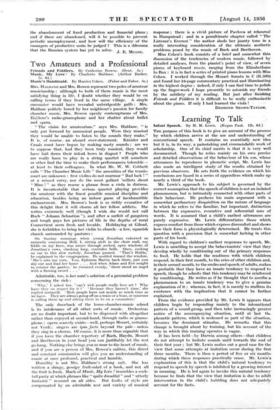Two Amateurs and a Professional Friends and Fiddlers. By Catherine
Bowen. (Dent. 5s.) Musk, My Love ! •By Charlotte Haldane. (Arthur Barker. 7s. 6d.) Music's Handmaid. By Harriet Cohen. (Faber and Faber. 5s.)
MRS. HALDANE and Mrs. Bowen represent two poles of amateur musicianship ; although to both of them music is the most
satisfying thing in life, I doubt whether they would be on calling terms if they lived in the same village. A single encounter would have revealed unbridgeable gulfs : Mrs. Haldane politely bored by her neighbour's passion for family chamber music, Mrs. Bowen openly contemptuous of Mrs.
Haldane's radio-gramophone and her chatter about ballet and opera.
" The claim for amateurism," says Mrs. Haldane, " is only put forward by unmusical people. Were they musical they would be unable to listen to the sounds they make."
It is, of course, an absurd over-statement. Kreisler and Casals must have begun by making nasty sounds ; are we to suppose that, had they been truly musical, they would have laid down their infant bows in disgust ? People who are really keen to play in a string quartet will somehow or other find the time to make their performances tolerable—
at least to their colleagues. In what Mr. W. W. Cobbett calls " The Chamber. Music Life " the amenities of the tennis- court are unknown : first violins do not murmur " Bad luck ! "
at a missed entry, nor do the most gallant 'cellists shout " Mine ! " as they rescue a phrase from a viola in distress.
It is incontestable that serious quartet playing provides the amateur with the finest passible musical discipline and education, besides being an indoor game of inexhaustible enchantment. Mrs. Bowen's book is so richly evocative of this delight that it will charm all her fellow addicts. She writes extremely well (though I wish she would not call Bach " Johann Sebastian "), and after a surfeit of gangsters and tough guys her pictures of life in the depths of rural Connecticut seem fresh and lovable. Holidaying at Gilead, she is forbidden to bring her violin to church—a low, squarish church surrounded by pastures :
On Sunday mornings when young Jonathan exhorted us earnestly concerning Hell, I, sitting aloft in the choir stall, my fiddle on my knee, was aware through arched, open windows of Jonathan's cows, clanking long, contralto bells. Once, cocking an ear to this slow melody, Jonathan paused. ' That's Hulda,' he explained to the congregation. He nodded toward the window. She's into my corn. You, Ephraim Martin back there, just you slip out and lead her home . . . And when Adam and Eve sought to reenter the garden,' he resumed evenly, there stood an angel with a flaming sword . . .
Adniirable, too, is her aunt's solution of a perennial problem concerning the rich : ' Why,' I asked her, can't rich 'people really love art ? Why have they no reaped for it ? " Because they haven't time,' she replied instantkt. ' Rich people have not nearly so much time as we have. They are always going off on a train or a boat, or someone is calling them up and asking them to be on a committee.'
The only drawback of the home-chamber-music school is its intolerance of all other sorts of music. Orchestras are no doubt important, but to be dispensed with altogether rather than enjoyed at second-hand, through radio or gramo- phone ; opera scarcely exists—well, perhaps Mozart, certainly
not Verdi ; singers are ipso „facto beyond the pale--unless they sing in a chorus. Of course, it is more than arguable that
if you have the chamber repertory of Bach, Haydn, Mozart and Beethoven in your head 'you can justifiably let the rest go hang. Nothing else brings you so near to the heart of music, and if you are a person of Mrs. Bowen's calibre, this direct and constant communion will give you an understanding of music at once profound, practical and humble.
Humility is not Mrs. Haldane's strong suit. She has
written a slangy, gossipy fruit-salad of a book, and not all the fruit is fresh. Much of Music, My Lobe f resembles a cock- tail party at which phrases like " quite dreadful " and " utterly fantastic " resound on all sides. But faults of style are compensated by an admirable zest and variety of musical
response ; there is a_ vivid picture of Pavlova at rehearsal in Hampstead ; and in a penultimate chapter called " The Listener's Everest " the author sheds her jaunty tone in a really interesting consideration of the ultimate aesthetic problems posed by the music of Bach and Beethoven.
' Miss Cohen's book consists of a brief and somewhat thin discussion of the tendencies of modern music, followed by detailed analyses, from the pianist's point of view, of seven pieces of keyboard music, ranging from the Elizabethans to Bax : it is in fact a series of printed piano lessons with Miss Cohen. I worked through the Mozart Sonata in C (K.330) and found her 24-page commentary practical and illuminating in the highest degree ; indeed, if only I can find time to polish up the finger-work I hope presently to astonish my friends by the subtlety of my reading. But just: after finishing Friends and Fiddlers it is difficult to be really enthusiastic about the piano. If only I had learned the viola I
DESMOND SHAWE-TAYLOR.






































 Previous page
Previous page